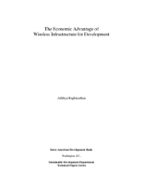The Economic Advantage of Wireless Infrastructure for Development
Date
Apr 2005
This paper explores wireless Internet infrastructure and associated costs in health, education, government, and commercial applications. It analyzes the cost-effectiveness of wireless provision of access and services in underserved (especially rural) areas, examining applications around the world. Current private sector activity in Latin America and the Caribbean is presented along with government and international development organizations efforts to promote wireless technologies in development projects. Attention is given to the policy barriers preventing the private sector from developing these technologies in the context of underserved markets, the role of government in providing universal service, and issues of spectrum allocation. Finally, recommendations are proposed for the IDB's future involvement in the area of wireless applications for development and wireless technology policy.



